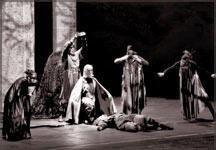A/L English Literature Made Easy - Drama : Macbeth by William
Shakespeare
Act 2 Scene 3
Scene 3 starts with the Porter's Scene giving a bit of relief in
"relaxing the tragic tension." This scene introducing normal life and
irony - "for Macbeth's castle is a hell."
Macbeth and his wife must have "time to remove the traces of the
crime." Shakespeare introduces the Topical Element through the character
of the porter.

The words such as - farmer, equivocator, tailor bring normalcy to the
mysterious situation. Macduff and Lennox enter, greeting Macbeth as he
arrives, and showing the anxiety to know about the king's movements.
Macbeth takes them to Duncan's room.
The oxymoron "a joyful trouble" is very significant and Lennox
narrating the strange, hellish disturbances of the night highlights the
monstrous actions.
The night has been unruly
Lamentings heard i'th' air
Lamentings heard i'th' air; strange screams of death
And prophesying with accents terrible,
--- the obscure bird
clamour'd the livelong night: some say, the earth
was feverous and did shake".
The significance of the dramatic irony in Macbeth's words is quite
relevant, for
'Twas a rough night
Macbeth is already guilty conscious.
Macduff re-entering the scene wailing
O horror, horror, horror! Tongue nor heart
Cannot conceive nor name thee!
Macduff's emotion is expressed in a very impressive manner, expressing
the violation and destruction of 'the temple of the living.'
The alarum bells were rung
Macduff's words to Lady Macbeth are set in a very ironic manner - O'
gentle lady,
'Tis not for you to hear what I can speak.
Banquo's response to Lady Macbeth's words LM. Woe, alas!
What in our house?
Banquo: "Too cruel anywhere" seem to reflect the inner feelings of
Banquo towards Lady Macbeth and her hypocritical attitude, when she heard
the sad news.
Macbeth trying to deceive by feigning grief but the inner meaning is
actually the sole truth to Macbeth.
Macbeth's narration of the tragic scene, of Duncan lying murdered in
the most villanous manner, reveals his hypocritical behaviour pattern.
Shakespeare has highlighted the innocence and genuine good qualities of
King Duncan in a perfectly touching manner. The trochee
"--- Here lay Duncan,
His silver skin laced with his golden blood;"
Lady Macbeth's words Help me hence, ho
trying to show the genuineness of Lady Macbeth's faint may be an
intimation of the "natural reaction of her over taxed powers".
Malcolm and Donalbain smell the danger ahead of them; their fate too
may be similar to their father's and they decide to set off before they
are seized.
"Let's away;
our tears are not yet brew'd"
Malcolm - nor our strong sorrow
Upon the foot of motion."
The repetition of the word 'our' may be a contrast in an ironic manner
relating to "Macbeth and his wife's carefully prepared out bursts" for
Macbeth seemed to have had over acted his part (according to Holinshed).
When all exeunt Malcolm and Donalbain decide to leave the country.
Malcolm leaving to England and Donalbain to Ireland; for their own safety:
for they suspected
"- there's daggers in men's smiles: the near in blood,
The nearer bloody."
The tyranny has not reached its final mark; as these two princes could
be the next victims for they're the heirs to the throne. But their flight
could divert "suspicion from Macbeth to themselves."
The "proverbial" phrase; 'near the near'.
"implying after all you were still no
nearer getting what you wanted."
However, Macbeth would be left free to claim the throne.
Act 2 Scene 4
Scene 4 "illustrates a very instructive feature of Shakespear's
dramatic methods: hisside scenes." There had been "a rush of tragic
incidents." The audience being able to view them in a retrospective
manner. The audience is made aware of the "the immediate after effects of
the occurrences."
The omens and signs - signalling and describing a murderer.
Shakespearean stage was supposed to have been hung with curtains as a
symbol of death. An old man and Ross enter the scene. The old man making
mention of the most dreadful night he had ever known.
"-- but this sore night
Hath trifled former knowings."
Ross agrees with the old man saying that the daylight being ashamed to
reveal the dreadful deed the "travelling lamp" the 'Sun' has disappeared
and darkness prevails
"That darkness does the face of the earth entomb."
Shakespeare's experience and thorough knowledge of country life and
sport and seems to be fond of 'hawking terms' which he uses in 'a
perfectly accurate' manner. Ross's reference to Duncan's horses, the
'minions' turning wild breaking the stall, showing disobedience as if
""they would make war with mankind. "Thus all incidents going against
natural order of things."
Macduff enters and takes into consideration the tyrannical situation
prevailing at present and the flight of the king's two sons, Malcolm and
Donaldbain. Thus sovereignty would fall upon Macbeth.
Macduff would go to Fife. He presumes that no one can tell "how matters
are likely to go and they may not meet again." The old man too leaving;
his wise words making a lot of sense "making good of bad and friends of
foes".
"God's benison go with you, and with those that would make good of bad,
and friends of foes!"
ACT 2 SCENE 4 is set in a very significant manner, forecasting the
horrible treacherous and cruel deeds to follow. Nature itself signalling
the cruel deeds of man, showing the nature's indifference to treacherous
deeds and displaying nature's arrogance to cruelty patronised by man.
Mrs. C. Ekanayake, Retd. Specialist Teacher Eng. Lit.,
St. Anne's College, Kurunegala
|